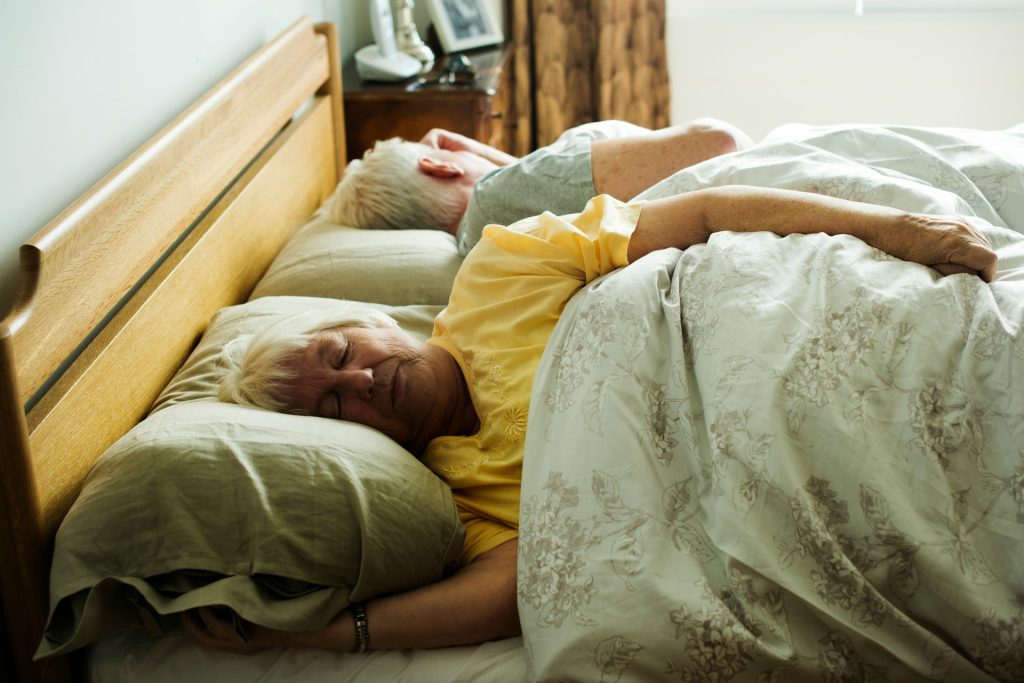Sleep is vital for everyone, especially seniors. As we age, our sleep patterns can change, making restful nights harder to come by. This can affect daily energy levels, mood, and overall health. Understanding these changes can help seniors improve their sleep quality and feel more active.
There are ways to help seniors get better sleep by creating a comfortable environment and developing healthy habits. A calm bedroom and good sleep routines contribute to a peaceful night’s rest. By making some lifestyle adjustments, seniors can enjoy deeper, more restful sleep.
Learning what affects sleep and how to make simple adjustments can transform sleep experiences for seniors. Through mindful changes in everyday activities, seniors can enjoy rejuvenating sleep every night. These improvements play an essential role in maintaining a balanced and healthy lifestyle, giving seniors the energy to engage fully in their days.
Understanding Sleep Changes in Seniors
As people age, their sleep needs and patterns can change significantly. These shifts may lead to a variety of sleep-related issues. Seniors often find that they wake up more frequently during the night, have difficulty falling asleep, or wake up earlier than intended. This can result in not feeling rested in the morning despite having a long sleep duration.
Common sleep issues that affect seniors include insomnia, sleep apnea, and restless legs syndrome. Insomnia makes it hard to fall or stay asleep. Sleep apnea, a condition where breathing stops briefly during sleep, can also disrupt rest. Restless legs syndrome causes uncomfortable sensations and an urge to move the legs, especially at night.
Many seniors also notice that their sleep patterns shift over time. The body’s internal clock, or circadian rhythm, changes with age, often leading to feeling sleepy earlier in the evening and waking up earlier in the morning. This shift can be frustrating and may affect daytime energy levels.
Understanding these changes can help seniors adapt and take steps to improve their sleep quality. Recognizing common sleep issues and adjusting to new patterns enables seniors to manage their sleep better, leading to improved health and well-being.
Creating a Sleep-Friendly Environment
The bedroom environment plays a crucial role in how well seniors sleep. Creating a comfortable and relaxing sleep space can make a big difference in sleep quality. Here are some tips to help seniors set up an ideal bedroom:
1. Choose a Comfortable Mattress and Pillows: The right mattress supports the body and reduces aches and pains, while comfortable pillows provide proper neck and head support.
2. Keep the Room Dark and Quiet: Use blackout curtains to block out light and consider using earplugs or a white noise machine to mask disruptive noises.
3. Maintain a Clean and Clutter-Free Space: A tidy bedroom promotes relaxation and reduces stress, making it easier to wind down at bedtime.
Lighting and temperature in the bedroom also influence sleep quality. Set the room to a cool and comfortable temperature, around 60 to 67 degrees Fahrenheit, to promote restful sleep. Avoid using bright lights before bedtime. Instead, use dim, soft lighting to signal the body that it’s time to relax and prepare for sleep.
Establishing Healthy Sleep Habits
Developing healthy sleep habits is a vital step for seniors looking to improve their rest. A consistent sleep schedule can help regulate the body’s internal clock, making it easier to fall asleep and wake up naturally. Seniors should try to go to bed and wake up at the same times every day, even on weekends, to reinforce this routine.
In addition to a regular schedule, creating a calming bedtime routine can signal the mind and body that it’s time to wind down. This could involve activities like reading a book, taking a warm bath, or practicing relaxation techniques. Relaxation techniques such as deep breathing, meditation, or gentle stretching can ease tension and calm the mind before bed. These practices help reduce stress and anxiety, making it easier to drift into restful sleep.
Avoiding stimulating activities before bed is also important. This means limiting exposure to screens, like TVs, computers, or smartphones, an hour before bed, as the light from screens can interfere with the body’s natural sleep-wake cycle. By establishing healthy sleep habits and routines, seniors can enjoy a more restful night’s sleep and feel more refreshed throughout the day.
Nutrition and Lifestyle Choices for Better Sleep
What seniors eat and their daily activities can significantly affect sleep quality. To promote better sleep, it helps to be mindful of foods and drinks consumed, especially in the hours leading up to bedtime. Seniors should avoid large meals, caffeine, and alcohol close to bedtime. Heavy or rich foods can cause discomfort, while caffeine and alcohol can disrupt sleep cycles.
Incorporating foods rich in sleep-promoting nutrients, like tryptophan, magnesium, and calcium, can be beneficial. Foods like turkey, nuts, whole grains, and leafy greens contain these nutrients and can be part of a balanced evening meal. Choosing a light snack, such as a banana with almond butter, in the evening might aid sleep without causing discomfort.
Daily physical activity is another key factor in promoting restful sleep. Regular exercise reduces stress and helps tire the body, making it easier to fall asleep. Activities like walking, swimming, or yoga are gentle options that seniors can enjoy. However, it’s important not to engage in vigorous exercise close to bedtime, as it may be stimulating.
Incorporating mindful nutrition and lifestyle choices supports better sleep and enhances overall health and wellness. Seniors can enjoy the mental and physical benefits of a good night’s sleep by making these intentional changes.
Conclusion
Achieving better sleep can significantly enhance the quality of life for seniors. By understanding the natural changes in sleep patterns that come with aging and making improvements to the sleep environment, seniors can greatly improve their rest. Establishing a routine that includes healthy sleep habits, relaxation techniques, mindful nutrition, and consistent physical activity can pave the way for better sleep quality. This not only contributes to enhanced physical health but also benefits mental and emotional well-being.
At Eightlimfit, we understand the importance of restful sleep for a balanced and healthy lifestyle. Our health and wellness programs are designed to support seniors in their journey to better sleep and overall wellness. If you’re looking to improve your sleep and embrace a healthier lifestyle, reach out to our Scottsdale personal trainers. We’re here to help you achieve your wellness goals with personalized guidance and support.

